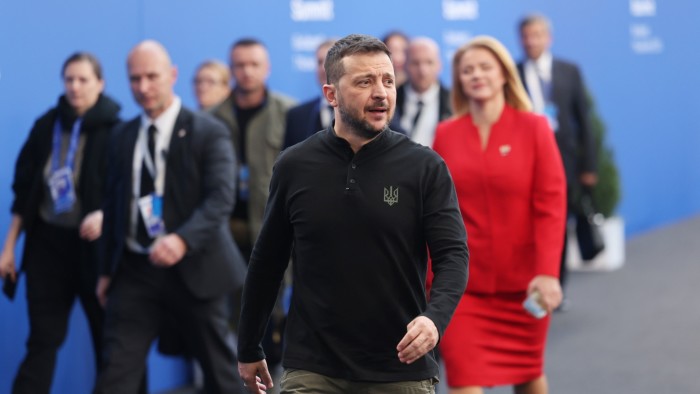Trump ushers in Europe’s high-stakes moment to defend Ukraine

This article is an on-site version of our Europe Express newsletter. Sign up here to get the newsletter sent straight to your inbox every weekday and Saturday morning. Explore all of our newsletters here
Welcome back. European leaders are still reiterating their “unwavering support” for Ukraine against Russian aggression. But they are rapidly approaching some very difficult decisions about how Europeans should continue to back their ally and protect their own long-term security if president-elect Donald Trump tries to engineer a peace deal between Kyiv and Moscow.
Ukrainian officials are sticking to their view that the US won’t abandon them to Moscow because to do so would be a signal of American weakness to the rest of the world. However, Trump’s first picks for his administration do not suggest he will be dissuaded from seeking a negotiated settlement, imposing unfavourable terms on Kyiv, dialling back US support and leaving the bulk of the effort to Europe. Let me know your thoughts at [email protected].
Europe’s moment?
“Nothing should be decided on Ukraine without the Ukrainians nor in Europe without the Europeans,” France’s President Emmanuel Macron said this week, after meeting Mark Rutte, the new Nato secretary-general in Paris. The trouble is the Europeans risk becoming mere bystanders unless they can work out what they want to achieve and how.
The only people who can save Ukraine are the Europeans, wrote historian Timothy Garton Ash, “yet our continent is in disarray”.
Germany’s coalition government has collapsed and it could be late spring before it has a new one. France’s political paralysis has left Macron weakened. The European Commission will soon have a new leadership team, but will be constrained by a lack of ambition in national capitals. Britain is outside the EU and unsure how to re-engage. Budgets are extremely tight everywhere.
But, as Garton Ash writes, “unless Europe can somehow rise to the challenge, not just Ukraine but the whole continent will be left weak, divided, and angry as we enter a new and dangerous period of European history”.
The EU and the UK do not have much time to waste if they want to have some say in deciding Ukraine’s future — and the repercussions for their own security arrangements. Trump has said he would try to end the war even before returning to office.
The imperative for Europe, says Thomas Kleine-Brockhoff, director of the German Council on Foreign Relations, is “to decide quickly whether the continent is unified enough to replace the Trump-led US as Ukraine’s primary military backer”.
In more specific terms, says Alexandra de Hoop Scheffer of the German Marshall Fund think-tank in Paris, that means Europe must “assert itself in the consultations; agree on the conditions that must not be sacrificed in a ceasefire; and continue to support Ukraine, even in the event of a frozen conflict, to prevent further Russian aggression”.
In other words, the Europeans will have to come up with more financial and military aid and a plan to guarantee Ukraine’s security to ensure that any deal is fair for Kyiv and will stick.
A seat at the table
One way to buy a seat at the table is to offer to carry more of the military aid burden. The US has so far provided some $60bn in weaponry and ammunition since February 2022 and the Europeans a similar amount (although more in financial aid).
The Europeans can surely afford to do more. If they don’t have the budgetary space, they should think of other ways of raising the money, such as common EU debt or loans to national capitals from the European Stability Mechanism, the eurozone’s rescue fund. (See this Centre for European Reform analysis of the options.)
Many of the weapons would still have to be bought from the US, given its larger army stocks and production capacities. That is likely to be more contentious than the higher financial burden, especially for France, which has insisted on bolstering the European defence industry. But it could help to please Trump and Europe could place longer-term orders with its own companies.
Some European governments might balk at spending more on what they may regard as a lost cause with Trump returning to power. But as my colleagues Christopher Miller and Max Seddon report, Ukraine is in an increasingly precarious position on the battlefield, which leaves it in a weak position for any talks.
Turn the tide
Jack Watling of the UK’s Royal United Services Institute makes a powerful argument for helping Ukraine turn the tide of the war before starting talks (and for Kyiv to play its own part by improving its army mobilisation and training programmes). Trump may not have the patience to wait for Ukraine’s fortunes to change for the better. Still, Watling, like many other western and Ukrainian analysts and officials, argues that with his troops grinding inexorably forward, Russia’s President Vladimir Putin has no incentive to come to the negotiating table.
The historian Sergey Radchenko agrees. “Trump, in his anxious determination to bring the war to a prompt close, may soon discover that Putin has a different timeline, and indeed a different goal.”
Radchenko has studied the talks between Ukrainian and Russian officials in March and April 2022, which scoped out the broad outlines of a peace deal (although it was never clear whether either Putin or Ukraine’s Volodymyr Zelenskyy would have backed it).
That putative ceasefire agreement involved: Ukrainian neutrality in exchange for bilateral security guarantees; de facto but not de jure Russian control of occupied territory pending a longer-term settlement; limits on Ukraine’s military capabilities; and sanctions relief. As Radchenko says, these issues look more intractable now than they did in 2022.
The most difficult is security guarantees for Ukraine once the fighting is over. Nato membership would be the neatest and possibly cheapest option. But it would surely be unacceptable to Putin and it is hard to see Trump agreeing to commit resources to an expanded alliance.
Can the Europeans offer meaningful guarantees that would reassure Kyiv? Would they be prepared to put boots on the ground in sufficient quantity? Will they, as Watling argues, invest heavily in producing the kind of weapons that would deter or defend against Russian attack, such as long-range air-to-ground missiles? And to what extent would Nato become engaged if any of Ukraine’s European guarantors were attacked?
These are big questions. It is most likely that the answers will come first from Ukraine’s Nordic and Baltic allies plus Poland and Britain. Poland’s Prime Minister Donald Tusk is leading efforts to form a pro-Ukraine front in a sign of a new alignment in Europe, writes Le Monde’s Sylvie Kauffmann. But France and Germany will also need to be brought on board if the European effort is serious.
Zelenskyy hopes that once Trump sees Putin’s intransigence there will be a surge in US weaponry to Kyiv. But, as Radchenko argues, it is also possible that Trump blames his failure as peacemaker on Zelenskyy’s refusal to compromise.
In the end, the American President may well choose to give up on Ukraine altogether, and so end the war, as he had promised, by letting Russia win it.
With Ukraine acting as Nato’s first line of defence, that would be a disaster for the alliance, especially if the Kremlin interprets it as US disengagement from Europe’s collective defence. The stakes could not be higher.
Donald Trump’s Pentagon pick sparks alarm — and scorn, by Felicia Schwartz in Washington
Ben’s pick of the week
Will Friedrich Merz get Germany to abandon its fiscal fetish? The implosion of Olaf Scholz’s three-way government has prompted fresh questions at home and also in Europe about the wisdom of the debt brake. Laura Pitel examines whether reform is on the horizon and where the opposition leader stands.
Recommended newsletters for you
FT Opinion — Insights and judgments from top commentators. Sign up here
Chris Giles on Central Banks — Vital news and views on what central banks are thinking, inflation, interest rates and money. Sign up here
#Trump #ushers #Europes #highstakes #moment #defend #Ukraine






